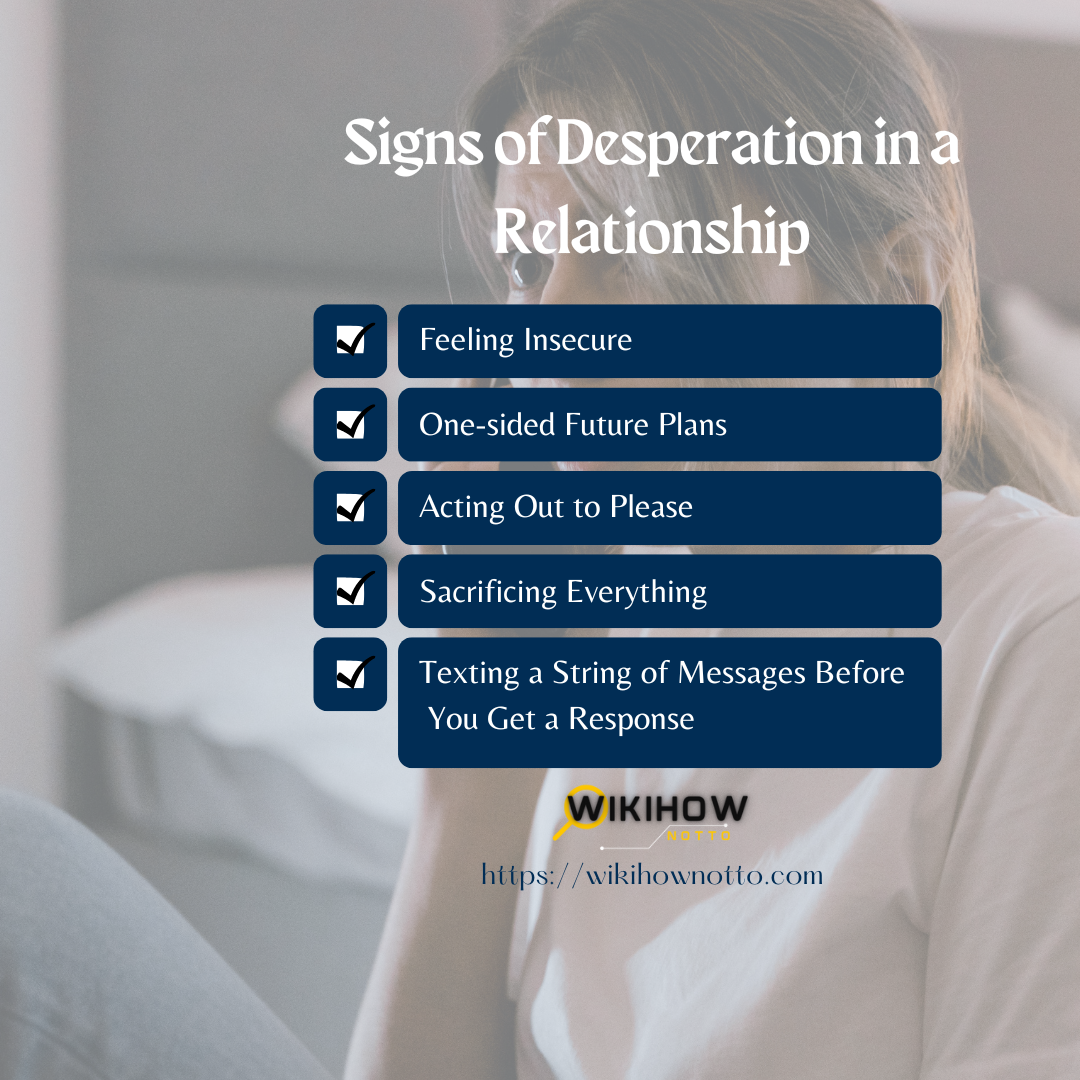How Not to Act Desperate in a Relationship

Relationships are like delicate ecosystems that require maintenance and care to thrive. But when you find yourself acting desperate in a relationship, it can quickly spiral out of control and cause lasting damage to your connection with your partner.
If you are worried that you may be getting too desperate in your relationship, it is important to take a step back and identify the signs of desperation. But how can you do this?
5 Signs of Desperation in a Relationship
Like red flags, there are many signs that you may be acting desperate in your relationship. Let’s take a look at some of the most common ones.

1. Texting a String of Messages Before You Get a Response
Do you constantly send your partner a string of texts and wait for hours or days before getting a response? This can signify that you may be trying too hard to please and engage with them.
One or two messages at a time are fine and can even be healthy. However, when you start to bombard your partner with messages, it may indicate that you are acting out of desperation.
Writing long messages can also be viewed as a sign of desperation, especially if they are overly sentimental or flowery. Try to keep your messages simple and straightforward, focusing on the main points that you want to get across.
2. Feeling Insecure
How do you know if you are feeling insecure in your relationship?
- Do you often feel worried or anxious about how your partner sees you?
- Do you panic when they don’t text or call as often as you would like?
- Do you feel overly jealous or possessive, even if your partner has done nothing wrong?
If any of these describe your feelings, it may be a sign that you are acting desperate in your relationship. Try to be honest with yourself about how you feel, and take steps to address these issues.
Insecurity manifests in many different ways, but it often comes down to a fear of losing your partner or not being good enough for them. Working through these feelings can be difficult and require honest self-reflection, but ultimately, the payoff is worth it.
3. One-sided Future Plans
If your partner seems uninterested in making future plans with you, this may be a sign that they are starting to pull away or that you are pressuring them too much.
It can be tempting to try and rush the process of making future plans or trying to mold your relationship in a certain way. However, it’s important for both partners to feel comfortable and engaged in the process.
If you notice that your partner is uninterested in future plans, try to back off and give them some space. This can help ease some of the pressure and tension between you while giving your relationship room to grow naturally.
4. Acting Out to Please
Do you find yourself acting a certain way or doing things to please your partner, even if it doesn’t feel true to yourself?
If you are constantly trying to put on a show for your partner or acting out to get their approval, this could be a sign that you are feeling desperate in your relationship.
While it’s completely normal to want to make your partner happy, it can also be unhealthy if you are sacrificing your needs and happiness to try to achieve this.
If you start to feel like you’re acting out of desperation, take a step back and reflect on what’s important in your relationship. If you both work together and support each other, there is no need to act desperate or put on a performance for your partner.
5. Sacrificing Everything
Finally, some people may be tempted to sacrifice everything for their relationship to make it work, even if it means giving up important things like friends and family, career goals, or personal happiness.
While relationships are certainly important and can bring us a lot of joy and fulfillment, they should never come at our expense of ourselves. Constantly putting your needs aside to make your relationship work is a sign of desperation and likely won’t result in a healthy or lasting relationship.
If you start to feel like your relationship is taking over your life and making you sacrifice too much, take a step back and evaluate what’s important to you.
7 Tips to Stop Being Desperate in a Relationship
Every relationship requires hard work and commitment, but there is a difference between being committed and being desperate.
To stop being desperate in your relationship, try these tips:

1. Love Yourself First
You can’t love and fulfill another person if you aren’t taking care of yourself first. Prioritize your needs and happiness, whether that means working on self-care or spending more time with friends and family.
But what does this have to do with being desperate in a relationship?
When you are feeling insecure or need constant validation, it can be tempting to try and get this from your partner. But this only works if they are willing to give it to you.
Instead of relying on your partner for these things, focus on building your self-esteem and self-confidence. This will help you feel more secure in yourself and in your relationship, without relying on your partner for validation.
You can also try engaging in positive self-talk, practicing mindfulness and gratitude, or seeking professional support if necessary.
2. Avoid Over-texting
It can be tempting to send lots of messages and updates to your partner throughout the day. This kind of constant communication can actually backfire and make your partner feel overwhelmed or smothered.
Instead of over-texting your partner, try setting specific times when you can check-in. For example, you might text them at lunchtime or before they go to bed each night. This allows regular contact without overwhelming your partner with sudden messages throughout the day.
Over-texting can also lead to other unhealthy behaviors, such as constantly checking in with your partner on social media or using texting and messaging apps to track their location.
If you notice that you are overly dependent on technology, consider taking a break from social media or deleting tracking apps on your phone.
3. Avoid Nagging Tendencies
How do we know if we are nagging?
Nagging is often characterized by a barrage of complaints and criticisms directed at your partner, usually with the goal of getting them to conform to what you want. Many people experience this as “one-upping” or simply never being satisfied with their partner’s behavior.
While it can be easy to slip into a nagging mindset, this type of behavior can actually push your partner away. If you constantly criticize or complain about your partner’s behavior, try taking a step back and finding other ways to express your needs.
For example, you might try engaging in healthy communication or setting boundaries around certain behaviors that bother you.
4. Regular Gift Apologies
Gifts are good, but they can be taken too far. One sign of desperation in a relationship is sending frequent gifts as apologies, even when you haven’t done anything wrong.
This may seem like a sweet or thoughtful gesture, but it can quickly become overbearing and make your partner feel obligated to reciprocate.
Instead of relying on gifts for validation or affection, try to find other ways to show appreciation and love in your relationship. For example, you might try showing more verbal affection or simply being there for your partner when they need support.
5. Don’t Rush the Process
No relationship is perfect. It can be tempting to try and rush things along to avoid potential problems down the road. But this kind of “head in the sand” thinking will only backfire later.
Instead, try to appreciate your relationship for what it is. Focus on finding compromises and solutions to issues as they arise.
It can also be helpful to remember that relationships are a two-way street. Your partner will have their needs and insecurities that need to be acknowledged and respected.
6. Learning to Let Go
There is a story about a frog and boiling water. If a frog is put into boiling water, it will immediately jump out to save itself from being cooked. However, if the same frog is placed in cold water that is slowly heated up, it won’t escape and will be cooked alive.
This story reminds us that we can become so used to the circumstances that we don’t realize when we need to change course.
If you are feeling desperate in your relationship, it can be helpful to take a step back and examine the signs that are telling you it’s time to move on. You might try journaling or talking through your feelings with a friend or therapist.
Above all, remember that there is no such thing as a perfect relationship – it’s all about finding someone who makes you happy and letting go of the rest.
7. Avoid Being Too Available
In a relationship, finding a balance between independence and interdependence is important. However, constantly trying to be available for your partner may signify desperation or insecurity in the relationship.
This behavior can often come across as clingy or smothering, pushing your partner away instead of drawing them closer. Avoiding this behavior can be as simple as having a bit more self-confidence, setting boundaries, and taking some time to pursue your interests.
Parting Shot
If you constantly feel desperate or insecure in your relationship, it may be time to reevaluate your approach. Over-texting, nagging or constantly relying on gifts to get your partner’s attention can all be signs of desperation.
To avoid these unhealthy behaviors and foster a healthier relationship, focus on love and support. Remember that relationships are two-way. Therefore, be mindful of your needs and theirs. Don’t be afraid to let go when it’s the right decision for you.





